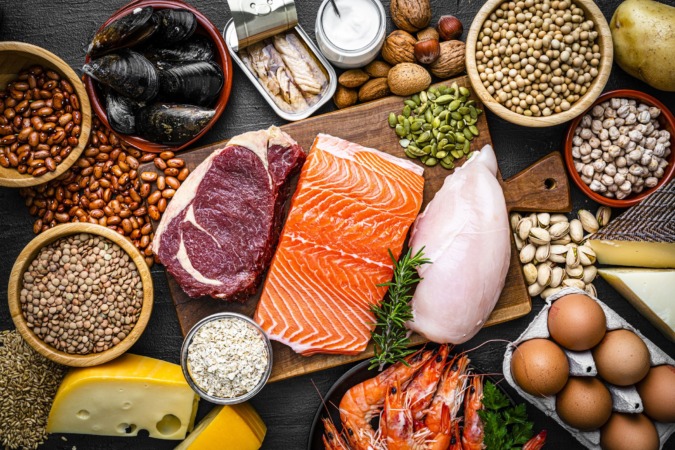
We join a gym, go daily without fail, workout rigorously, give up on our social life to have that ripped body, and also turn a blind eye to our favorite Chinese and Continental delicacies that we crave!
But even after six months of keeping up with this torture, our body refuses to show signs of improvement, let alone having a shape that would make us wear a tee that would make us look like Adonis.
And here’s what happens next. We talk to different kinds of coaches and beefed-up gym mates who tell us, “Dude, you need to add some serious protein to your diet to get long-lasting mass.” We make a beeline to a supplements store, buy the most popular protein on the rack and start feeding on it as if our lives depended on it.
Read: Yoga Arm Balances – How To Master
Yes, protein helps us grow muscles. Yes, it helps us in revitalizing our cells and, yes, it helps them recuperate from the stressful strains of the gym and heavy lifting. But, as they say, “Excess of anything is bad,” the same implies to proteins too. Needless to say, half of us don’t even know how much protein is enough protein for our bodies. And without knowing this pivotal information, most of our gym work and diet end up having an adverse effect on our body.
Methods of calculation
Firstly, the daily intake of protein depends on your age and the activity level that your body endures itself. For example, the amount of protein that weight trainers and teenagers require is much more than what a sedentary individual would need. Now, there are a few calculations that can be used in terms of protein recommendations that you must know of to make life simple. And the easiest way is to go by the total percentage of calories per day.
In other words, it’s safe and within normal limits to consume twenty to thirty percent of your total daily calories from optimal protein sources such as lean meats, eggs, and dairy products. What it means is, if you are a male consuming 1,800 calories per day and 20 percent of the calories are derived from protein, the calculation would be: 1800 x 0.20 = 360 calories from protein. Since one gram of protein is equal to four calories, divide protein calories by four, which comes to 90 grams of protein daily.
For the ones who do not workout
RDA (Resources Development Administration) has set the safe measure for protein consumption at 50 grams a day, which might look a bit low on numbers. But if you meet this level of intake, in all likelihood, it’s unlikely you will suffer from any deficiency in dietary protein. What one needs to understand here though is that the RDA originally set the standard based on ‘normal’ people, which was a sample of sedentary people of somewhat normal BMI of 18.5-25 with a mixed diet of adequate calories. Therefore, if your goals are merely to live a regular life and not regularly partake in any physical activity, the standard mentioned above will suffice your needs.
Who and how much?
Depending on both–body weight and activity level–the amount of protein needed for everyone else can be a debatable topic. Although there are no specific guidelines, there is some research that gives approximate ranges:
– The base level (assuming no activity and no desire to change body composition) is around 0.8g per kilogram body weight 64g for an 80kg person.
– An athlete or highly active person, or a person who is sedentary and looking to lose body fat would do well with a range between 1-1.5g per kilogram. This equates to 110-140g daily for for a 80kg person.
– If you are an athlete who trains extensively to benefit and influence your body composition then you should be consuming around 140-200g of protein every day.
Diet tips to increase your protein intake
Chicken
• Chicken breast, 3.5 oz – 30 grams protein
• Chicken thigh – 10 grams (for average size)
• Drumstick – 11 grams
• Wing – 6 grams
• Chicken meat, cooked, 4 oz – 35 grams
Fish
• Most fish fillets or steaks, 3-1/2 ounces – 22 grams protein
• Tuna, 6-oz can – 40 grams
Eggs and dairy
• Egg, large – 6 grams protein
• Milk, 1 cup – 8 grams
• Cottage cheese, 1/2 cup – 15 grams
• Yogurt, 1 cup – usually 8 to 12 grams, check label
• Soft cheeses (Mozzarella, Brie, Camembert) – 6 grams per oz
• Medium cheeses (Cheddar, Swiss) – 7 or 8 grams per oz
• Hard cheeses (Parmesan) – 10 grams per oz
Beans (including soy)
• Tofu, 1/2 cup – 20 grams protein
• Tofu, 1 oz – 2.3 grams
• Soy milk, 1 cup – 6-10 grams
• Most beans (black, pinto, lentils, etc.) – about 7-10 grams per half cup
• Soy beans, 1/2 cup cooked – 14 grams
• Split peas, 1/2 cup cooked – 8 grams
Diet source- Canadianliving.com
No related posts.




